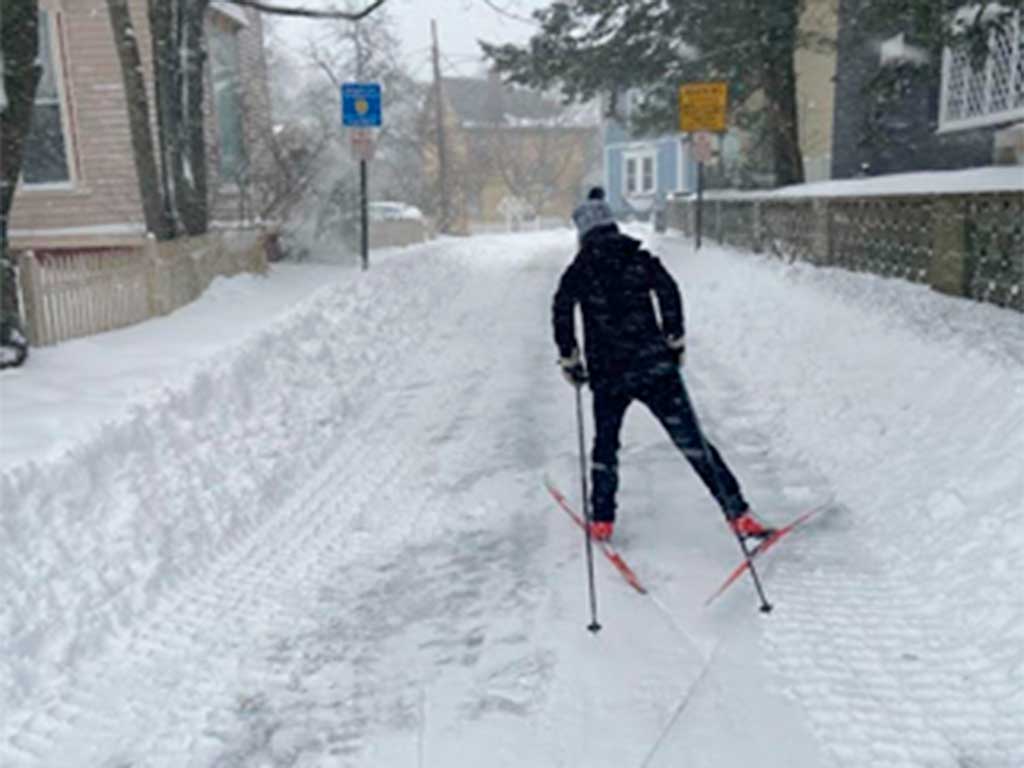By Adam Marletta
“Blow, blow thou winter wind,” Shakespeare wrote in As You Like It. “Thou art not so unkind/As man’s ingratitude.”
It is, perhaps, a fitting quote for this unrelenting winter with its merciless one-two-punch of back-to-back snow storms.
Winter 2015 has already been one for the record books. Snow is piled up so high in the city many streets have effectively become single-lane, one-way roads.
The barrage of winter storms have become a ubiquitous source of conversation at work, school, and among friends. In describing this “crazy” winter, people use terms like “weird,” or “unreal.” Some have even dubbed it “Snowpocalypse.”
But there are two crucial words missing in nearly all discussions about the weather: “Climate change.”
Contrary to conservatives’ absurd anti-science arguments, the presence of snow does not undermine the existence of anthropogenic (or human-induced) global warming. In fact, counter-intuitive as it may seem, climate change is expected to lead to greater frequency–and intensity–of snowfall.
This is because warmer air absorbs more moisture. As storms travel over the warming oceans, the increased atmospheric moisture causes them to grow in strength and intensity. When it is particularly cold—below freezing, to be exact—that atmospheric moisture comes down as precipitation in the form of rain, snow, or a “wintry mix” of the two.
According to Kevin Trenberth, senior climate scientist at the National Center for Atmospheric Research, global warming has led to coastal sea surface temperatures “exceeding 7 degrees F above normal in parts and 4 degrees F over huge expanses, thereby resulting in 15-20 percent more moisture in the atmosphere” (“As Boston’s Crazy Snow Keeps Falling…” Thinkprogress.org, 02/12/2015).
As the aptly-named Cliff Weathers writes in a recent story for AlterNet.org, these sorts of winters “might become the new normal” (“The Real ‘Snowpocalypse’ is in Boston…” 02/11/2015).
“Climatologists agree that global warming will continue to make these storms worse over time,” he writes.
And while it is true no individual storm can be directly attributed to climate change, rising global temperatures and a moister atmosphere increase the overall likelihood of severe weather.
“The answer to the oft-asked question of whether an event is caused by climate change is that it is the wrong question,” said Trenberth. “All weather events are affected by climate change because the environment in which they occur is warmer and moister than it used to be.”
In other words, if you are fed up with all this snow you had best start taking action against climate change. And the first step toward that end is making climate change an integral part of our weather-oriented conversations.
Last year was the warmest year on record according to NASA and the National Oceanic and Atmospheric Administration (NOAA). Scientists predict the rapidly melting Arctic sea ice will be entirely gone by 2030—perhaps even sooner.
And a major study published last month in the science journal Nature was unusually direct: The planet’s existing sources of fossil fuels—including coal, oil, and “most Canadian tar sands”—must be left in the ground to avoid a global temperature rise of 2 degrees Celsius.
(Two degrees may not seem like a heck of a lot. But, given the Earth’s relatively delicate homeostasis, such a rise in temperature could prove catastrophic. As it is, most projections place us on track for an unfathomable 5-6 degrees by the end of the century, barring a massive reduction in CO2 emissions.)
Finally, as I noted in a previous column, it is important we understand it is the system of industrial capitalism—and not, as many environmentalists would have us believe, consumer habits and lifestyle choices—that is the primary cause of the climate crisis.
While driving less, using energy-efficient appliances, and buying fewer Apple gadgets are all worthwhile ways we can each reduce our own carbon footprint, sadly, these individual actions alone are not enough to save the planet. Consider that just 90 corporations--most of them oil companies like ExxonMobil, BP, and Chevron–are responsible for nearly two-thirds of CO2 emissions since the Industrial Revolution, according to researchers in the journal Climatic Change.
In other words, even if we all gave up our cars tomorrow, the overall effect on global CO2 emissions would be negligible. The world’s billionaire financial elite and the corporate state have despoiled the planet–not you and me.
“The danger of green consumerism,” writes Clive Hamilton in his sobering book, Requiem For a Species: Why We Resist the Truth About Climate Change, “is that it transfers responsibility from the corporations mostly accountable for the pollution, and the governments that should be restraining them, onto the shoulders of private consumers.”
This is why any serious effort to curb the worst effects of climate change must understand the climate crisis as an inevitable result of capitalism–a system that is fundamentally at odds with sustaining life on Earth.
“The winter seemed reluctant to let go its bite,” writes John Steinbeck in East of Eden. “It hung on cold and wet and windy long after its time.”
As they say, everybody complains about the weather, but nobody is doing anything about it. Let’s start doing something about it–before we find ourselves in the midst of the real life “Snowpocalypse.”







1 Comments
Michael Anthony
people are doing stuff about it adam! maybe you could report on more radical aspects of the environmental movement, and think outside of the US, rather than dismiss everything. i respect your criticisms of the movement, but you really havent looked for alternatives it seems. they are there.
mary mason is serving the rest of her 20 some years in jail along with many others folks will probably never hear of, who are bringing the war home. the green scare is a thing, it would seem silly for the government to wage a war on environmental terrorism, if folks werent doing anything to help the environment.
deep green resistance, earth first, earth liberation front
deep ecologists and green syndicalists like judi bari
im working with anarcho syndicalists to develop an international intersectional platform based on judi baris work, and have hope that we can help reinvigorate the labor movement, and bring back popular support by introducing a radical revolutionary undertow within the movement, agitating existing unions, workers centers, and new forming solidarity networks(direct action fronts for labor).
judi was one of the first to point out that because its not consumption thats the problem and thus consumers who need to be organized to either recycle minimize waste or channel their consumption in “greener” ways. its not even the factories, or refineries, and its not the corporate headquarters. its the front line exploitation of the environment, the trucks, the drills, the seismic testers, where it all begins, a relatively small number of workers have all the power to shut down the entire industrial economy, and so thats is there we need to prioritize our organizing if we want to stop climate change.
workers have been at the forefront of all environmental issues, changing factory processes that were harmful to them and surrounding communities. and in turn reducing pollution and emmissions.
todays unions have become defensive and conservative reactionary and pittiful. but this is at least in part due to their traditional workerist aproach to labor organizing, and relative privelege compared to the rest of the struggling working class. they are almost completely irrelivant to the world outside of their union shops. pretty soon there wont be an outside world, unless labor brings its economic teeth to the fight.
http://theanarchistlibrary.org/library/jeff-shantz-syndicalism-ecology-and-feminism-judi-bari-s-vision